
Measuring Happiness is a difficult thing, but one initiative at the United Nations has been trying to figure it out. Every year, the U.N. Sustainable Development Solutions Network publishes its World Happiness Report—a study that examines the connections between happiness and development, all while encouraging policymakers to place more of an emphasis on the former. Around 1,000 people in each U.N. member state rate their quality of life on a scale from 0 to 10, while researchers cull data from six areas: income, freedom, trust in government, healthy life expectancy, social support from family and friends, and generosity. The World Happiness Report 2021 was released recently, and while the results follow previous trends (every Nordic country made the cut)—the list is a little more interesting amid the COVID-19 pandemic. The report paid special attention to evaluate how different governments have dealt with the pandemic, and how trust in said governments is directly related to overall happiness.
Even though the top 10 list has remained virtually the same year over year, we still recommend checking out the full list below. Who knows? Maybe reading about these places will put a smile on your face today.
1. Finland
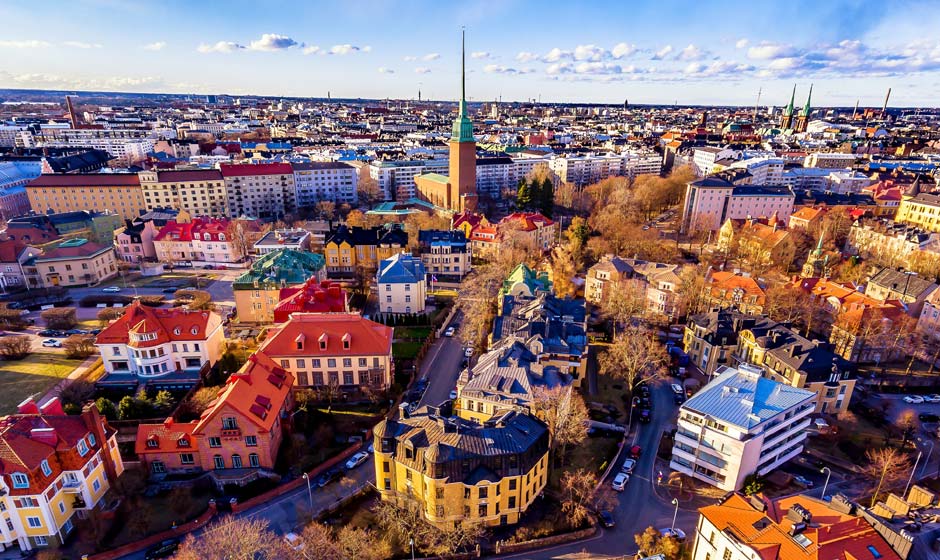
Finland is a Northern European nation bordering Sweden, Norway and Russia. Its capital, Helsinki, occupies a peninsula and surrounding islands in the Baltic Sea. Helsinki is home to the 18th-century sea fortress Suomenlinna, the fashionable Design District and diverse museums. The Northern Lights can be seen from the country’s Arctic Lapland province, a vast wilderness with national parks and ski resorts.
For the fourth year in a row, Finland is number one when it comes to happiness. The country consistently ranks among the top education systems in the world, occasionally beaten out by countries like South Korea, Japan, and Singapore. Much of that success comes from a widespread reverence for teachers, who are required to have a master’s degree (their education is state-funded), and a pedagogical system that focuses less on quantitative testing and more on experiential learning and equal opportunity.
2. Denmark
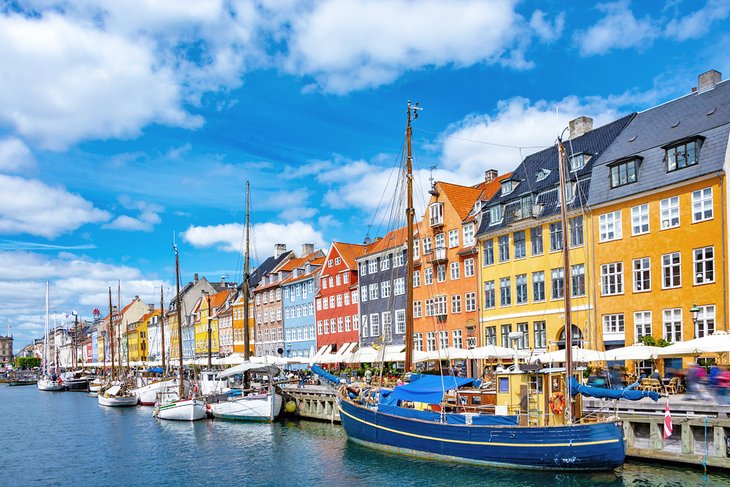
Denmark is a Scandinavian country comprising the Jutland Peninsula and numerous islands. It’s linked to nearby Sweden via the Öresund bridge. Copenhagen, its capital, is home to royal palaces and colorful Nyhavn harbor, plus the Tivoli amusement park and the iconic “Little Mermaid” statue. Odense is writer Hans Christian Andersen’s hometown, with a medieval core of cobbled streets and half-timbered houses.
Denmark remained in the number two spot this year. The country rates near the top in all the reported metrics—life expectancy, social support, and generosity among them—but it is also a country hugely committed to renewable energy production (39.1 percent of its energy was wind-generated in 2014). Home to the world’s most bike-friendly city and a coastline that you could spend a lifetime exploring, the country’s happiness certainly comes in part from a respect for the planet it’s built on. But a recent study from the Copenhagen-based Happiness Research Institute (whose existence is probably reason enough for a top spot) narrows down Denmark’s happiness to a number of different categories, including trust in the government, economic security, freedom, civil participation, and work-life balance.
3. Switzerland
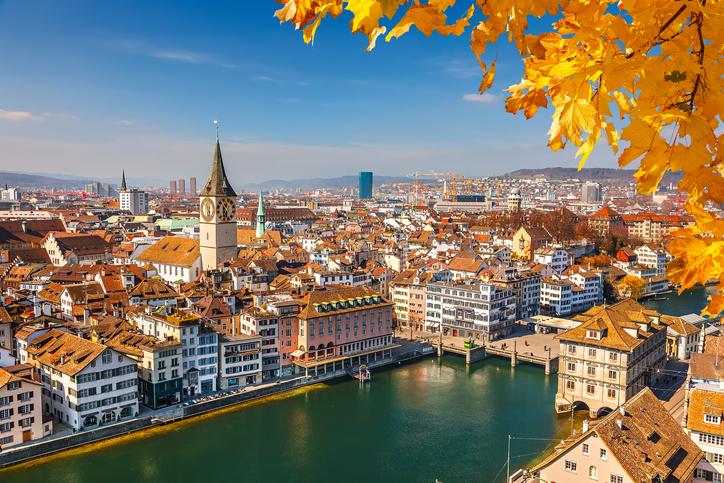
Switzerland is a mountainous Central European country, home to numerous lakes, villages and the high peaks of the Alps. Its cities contain medieval quarters, with landmarks like capital Bern’s Zytglogge clock tower and Lucerne’s wooden chapel bridge. The country is also known for its ski resorts and hiking trails. Banking and finance are key industries, and Swiss watches and chocolate are world renowned.
Switzerland (which moved up three spots this year) is a country where everything is voted on, from how many vacation days workers should have to how many immigrants should be allowed into the country, and referendums down to the local level happen many times a year. This system of direct democracy means that Swiss citizens feel an unparalleled sense of participation in their country’s evolution, from landmark decisions on human rights to whether a new traffic light should be installed in their neighbourhood. The Swiss are known to be insular, and it can be off-putting to first-time visitors, but there is a strong social fabric held together by a belief that every voice matters, which can go a long way toward feeling content.
4. Iceland
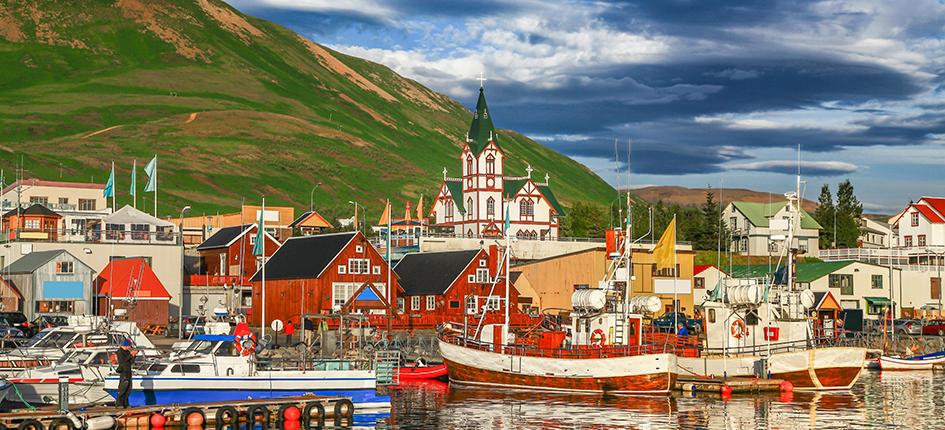
Iceland, a Nordic island nation, is defined by its dramatic landscape with volcanoes, geysers, hot springs and lava fields. Massive glaciers are protected in Vatnajökull and Snæfellsjökull national parks. Most of the population lives in the capital, Reykjavik, which runs on geothermal power and is home to the National and Saga museums, tracing Iceland’s Viking history.
Iceland ranks high in terms of the proportion of respondents who said they felt like they had a fellow citizen to count on when the going gets rough. This perhaps became most obvious in the wake of the country’s post-2007 financial collapse and subsequent revitalization. You’d think that the perpetual flood of American tourists into Reykjavik might have dealt a blow to the residents’ happiness—it’s got to be a little harder to get that dinner reservation than it used to be, after all—but when it comes to well-being, the Icelanders are unfazed. Perhaps it has something to do with the fact that they can always escape the city to a countryside that looks like another planet.
5. Netherlands

The Netherlands, a country in northwestern Europe, is known for a flat landscape of canals, tulip fields, windmills and cycling routes. Amsterdam, the capital, is home to the Rijksmuseum, Van Gogh Museum and the house where Jewish diarist Anne Frank hid during WWII. Canalside mansions and a trove of works from artists including Rembrandt and Vermeer remain from the city’s 17th-century “Golden Age.”
The biggest stat from the Netherlands this year, That its happiness levels have barely changed (we’re talking less than 0.03 percent) between 2005 and 2020. And in the Netherlands, it turns out, happiness starts young. A 2013 Unicef report rated Dutch children the happiest in the world, based on a number of metrics related to educational well-being, safety, and health.
6. Norway

Norway is a Scandinavian country encompassing mountains, glaciers and deep coastal fjords. Oslo, the capital, is a city of green spaces and museums. Preserved 9th-century Viking ships are displayed at Oslo’s Viking Ship Museum. Bergen, with colourful wooden houses, is the starting point for cruises to the dramatic Sognefjord. Norway is also known for fishing, hiking and skiing, notably at Lillehammer’s Olympic resort.
Norway has been dropping in this ranking since 2017, when it held the top spot, and this year it comes in as the sixth-happiest country in the world. But there’s not too much to complain about. The mix of a well-integrated government welfare system and a thriving economy built on responsible management of its natural resources (good riddance, fossil fuel-powered cars) means that very few are left behind, and the feelings of social support, trust in government, and economic well-being that come from that all contribute to overall happiness.
7. Sweden
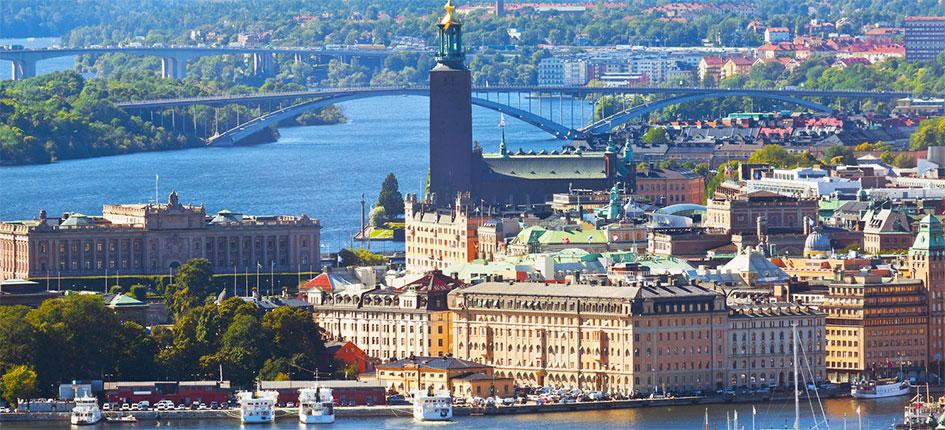
Sweden is a Scandinavian nation with thousands of coastal islands and inland lakes, along with vast boreal forests and glaciated mountains. Its principal cities, eastern capital Stockholm and southwestern Gothenburg and Malmö, are all coastal. Stockholm is built on 14 islands. It has more than 50 bridges, as well as the medieval old town, Gamla Stan, royal palaces and museums such as open-air Skansen.
This year, Sweden remained in the seventh spot. A high GDP per capita, which it shares with many of its Nordic neighbours, is not the sole reason, either: An emphasis on social equality that is built into the education system starting in kindergarten, 16 months of paid family leave that can be split between a couple after a new child is welcomed into a family, and free day care also make Sweden the best country for women, according to a separate study. Basically, an emphasis on work-life balance leads to a happier populace.
8. Luxembourg
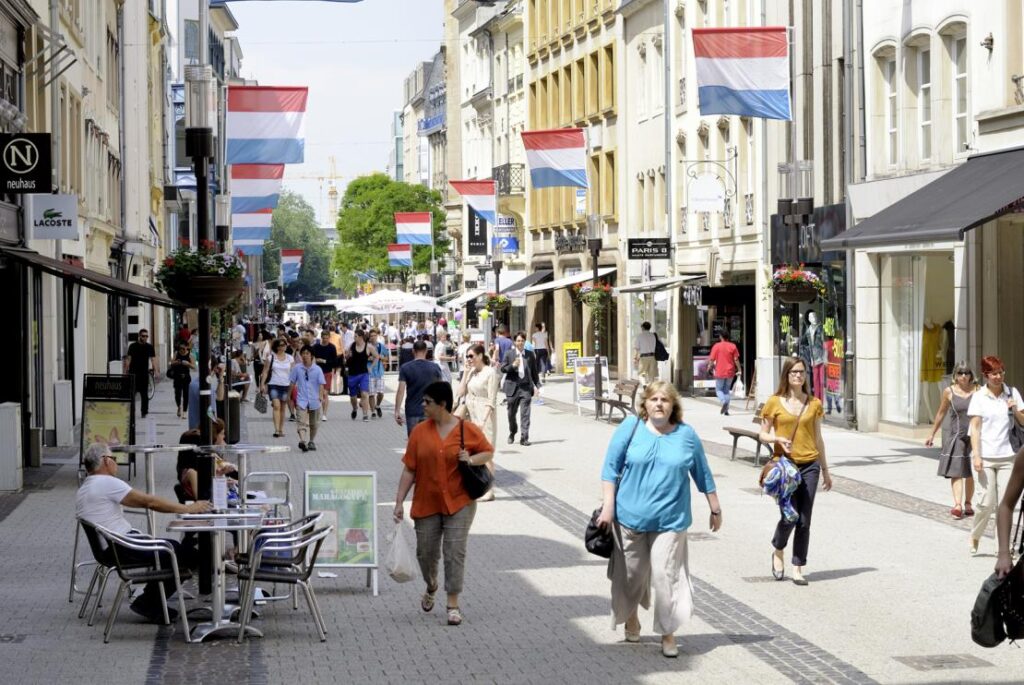
Luxembourg is a small European country, surrounded by Belgium, France and Germany. It’s mostly rural, with dense Ardennes forest and nature parks in the north, rocky gorges of the Mullerthal region in the east and the Moselle river valley in the southeast. Its capital, Luxembourg City, is famed for its fortified medieval old town perched on sheer cliffs.
Luxembourg made quite the upward leap—from 14th to 10th. With a population under 600,000, the small country offers high salaries and a strong social security system to help its citizens after retirement. But before you jump to the conclusion that money is actually buying happiness in Luxembourg, the country has many other perks that have nothing to do with cash, including a great healthcare system and excellent work-life balance (probably due to the mandatory five weeks of vacation time).
9. New Zealand
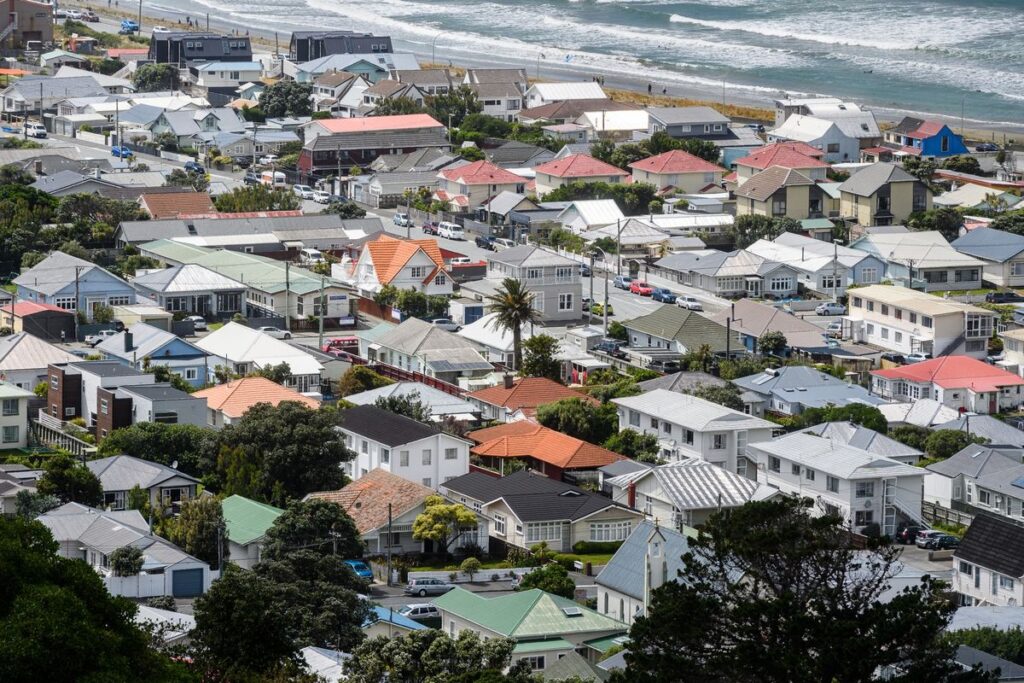
New Zealand is an island country in the southwestern Pacific Ocean. It consists of two main landmasses—the North Island and the South Island —and more than 700 smaller islands, covering a total area of 268,021 square kilometres.
Sure to fuel an already burning rivalry, New Zealand beat its neighbor Australia, who didn’t even make the top 10, this year. Condé Nast Traveler readers say, year after year, that Kiwis are a warm, welcoming bunch, but according to the U.N.’s research, a lot of that comes from satisfaction not only when they’re out and about, but also in the workplace. We would guess the country’s vast natural wealth—its beaches, vineyards, and mountains—plays a role, too.
10. Austria
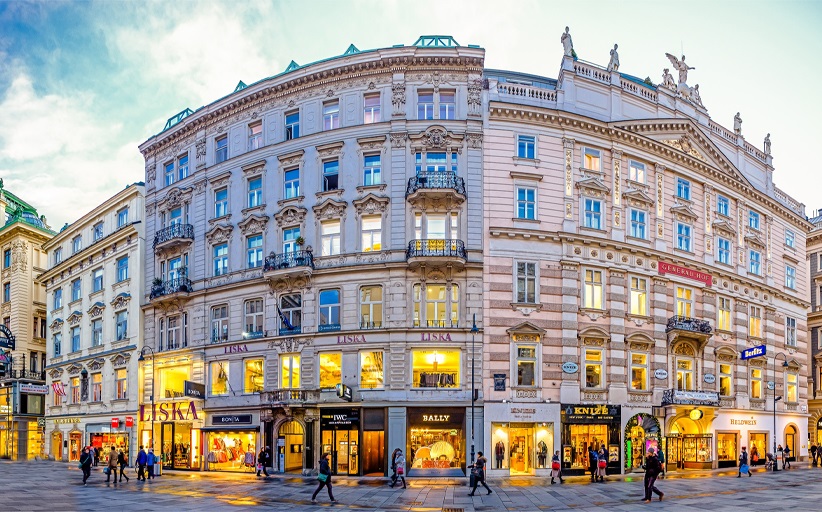
Austria, officially the Republic of Austria, is a landlocked East Alpine country in the southern part of Central Europe. It is composed of nine federated states, one of which is Vienna, Austria’s capital and largest city.
Austria made the cut this year with high scores in life expectancy and GDP per capita. One main takeaway from the institute’s continuing research is that if you want to be happy, the first step is to stop stressing about how happy you are and go for a bike ride. Biking is one of our favourite ways to get around Austria, so we suspect riding might help out with happiness rankings.
Financial and Business expert having 30+ Years of vast experience in running successful businesses and managing finance.





